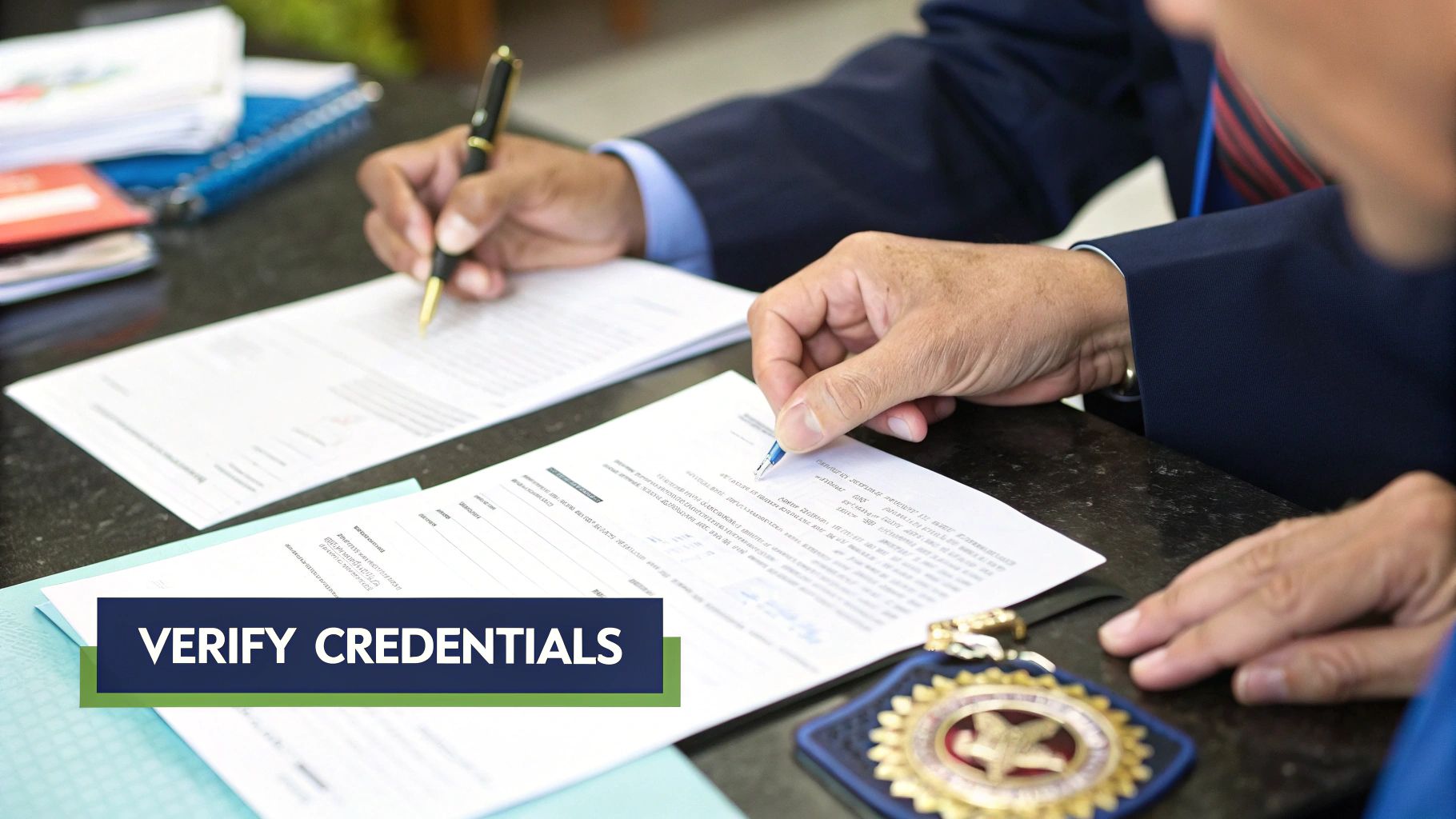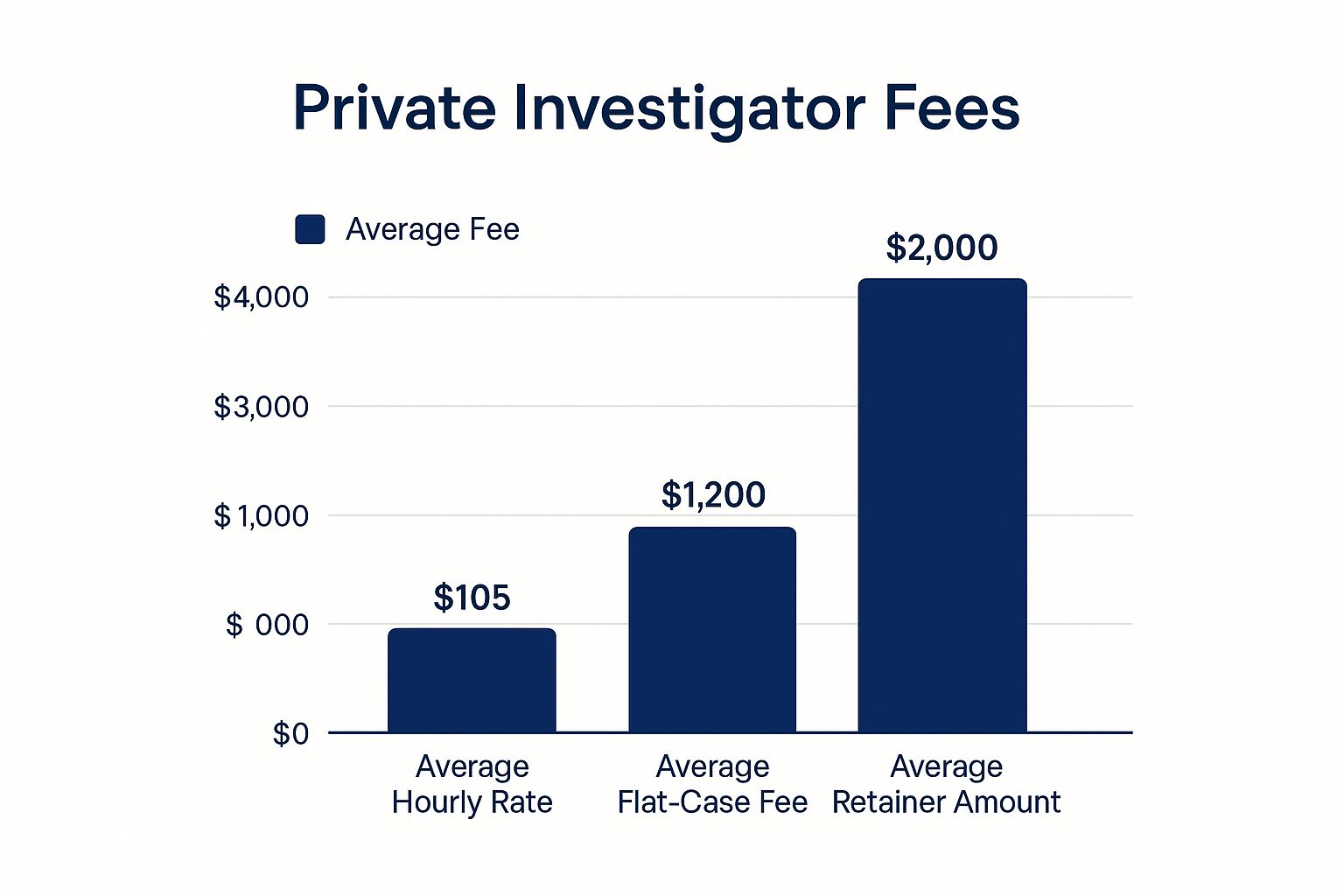How to Hire a Private Investigator: Expert UK Guide
- Sentry Private Investigators

- Jun 4, 2025
- 12 min read
Updated: Jul 28, 2025
Recognising When You Need Professional Help
Knowing when to hire a private investigator is an important first step. It's about understanding that some situations call for specialised skills and resources you might not have. This decision can be emotionally challenging, so it’s crucial to recognise the circumstances that warrant professional help.
Common Scenarios Requiring a Private Investigator
Several situations often benefit from the expertise of a private investigator. Suspected infidelity, for example, is a common reason people seek these services. Gathering evidence discreetly and legally requires specialised training and tools. Similarly, missing person cases frequently demand the investigative techniques and resources a private investigator can offer.
Suspected Infidelity: Infidelity can cause emotional distress and have legal and financial implications, particularly during divorce. A private investigator can gather evidence legally and discreetly.
Missing Persons: Finding a missing person often requires access to databases and investigative methods unavailable to the general public.Time is critical, making professional assistance extremely valuable.
Corporate Fraud: Businesses suspecting fraud or embezzlement need professionals with expertise in financial investigations. They can collect admissible evidence, protecting company assets and preventing future losses.
These examples highlight the variety of circumstances where a private investigator's skills are essential. Recognising the complexity of your situation and the potential legal ramifications is paramount.
Evaluating Your Specific Needs
Not every difficult situation requires a private investigator. However, some factors indicate when professional help is advisable. If you suspect illegal activity, for instance, gathering evidence yourself could jeopardise the investigation or even endanger you. In these cases, involving law enforcement or a qualified investigator is critical.
Legal Implications: If your situation has legal ramifications, such as a custody dispute or lawsuit, a private investigator can collect admissible evidence to support your case.
Safety Concerns: If you feel threatened or unsafe, a private investigator can provide surveillance or other protective measures. They can assess potential risks and develop strategies to ensure your safety.
Lack of Resources: If your attempts to gather information have been unsuccessful, a private investigator’s access to specialised databases and techniques can prove invaluable.
Deciding to hire a private investigator involves weighing the emotional and practical factors. Carefully considering the potential benefits and limitations is crucial. This thorough evaluation helps ensure a more productive engagement with a professional investigator. Taking these factors into account will also help you decide if hiring a private investigator is the right choice for your specific situation. More information on hiring a private investigator can be found here.
Navigating Different Investigation Specialties
Hiring a private investigator in the UK can feel overwhelming. With so many options, how do you choose the right one? The investigative field is diverse, with specialists catering to a range of needs. Selecting the right expert can significantly influence the outcome of your case. This means understanding the different types of private investigators available, from those specialising in matrimonial cases to those focused on corporate fraud.
Specialisations Within Private Investigation
Like medical doctors, private investigators also specialise. Matrimonial investigators, sometimes called private detectives, concentrate on relationship issues like infidelity or child custody disputes. Their knowledge of family law and discreet evidence gathering is crucial in these sensitive situations. Corporate investigators, on the other hand, handle white-collar crimes such as fraud and embezzlement. Their financial expertise and understanding of corporate regulations are key in these cases.
Matrimonial Investigators: Experts in relationship investigations, including infidelity and child custody disputes.
Corporate Investigators: Skilled in financial investigations, uncovering fraud, embezzlement, and company misconduct.
Digital Forensics Specialists: Focus on recovering and analysing electronic evidence, essential in our digital world.
These are just a few examples, and many investigators offer a blend of services. Knowing about these specialisations helps you narrow your search for the right fit.
The Impact of Technology on Modern Investigations
Technology has changed private investigation. GPS tracking, social media analytics, and advanced surveillance techniques offer investigators potent tools. For instance, GPS tracking can provide undeniable proof of someone's whereabouts, while social media analysis can reveal hidden connections or behaviours. This leads to more efficient evidence gathering and often produces results that were once impossible to obtain. This highlights the importance of considering a private investigator's tech skills when hiring in the UK. Learn more about this topic.
Matching Your Needs to the Right Investigator
Finding the right investigator begins with knowing your specific requirements. What type of investigation do you need? What kind of evidence are you hoping to find? If you suspect infidelity, a matrimonial investigator is your best bet. If you suspect corporate fraud, a corporate investigator with financial investigation expertise is more appropriate. This targeted approach increases the chances of a successful outcome.

Identifying Genuine Expertise
The field of private investigation is largely unregulated. This makes distinguishing true expertise from general claims critical. Look for professional memberships, such as the Association of British Investigators, as this shows a dedication to professional standards. Check claimed experience by looking at testimonials and case studies. A thorough review of an investigator's qualifications protects you from unqualified individuals. Starting with a reputable agency like Sentry Private Investigators also helps. This ensures you're working with a professional who understands your situation and can navigate the legal and ethical aspects of your case.
Evaluating Credentials Without Getting Fooled
Hiring a private investigator in the UK requires careful consideration. The lack of mandatory licensing means you must be extra diligent in verifying a potential investigator's credentials. But this isn't as overwhelming as it sounds. It simply requires a structured approach, much like choosing a surgeon – you wouldn't select one without verifying their medical qualifications and experience, would you?
Essential Qualifications and Memberships
Start by looking for verifiable qualifications. While formal licensing isn't a requirement, certifications related to the field demonstrate a commitment to professional standards. For instance, membership with the Association of British Investigators (ABI) signifies adherence to a code of ethics and best practices. Don't forget to check for proven industry experience, too. Years of experience, especially in your specific area of need, are essential. This is similar to choosing a specialist doctor for a particular medical condition. You might be interested in: How to master surveillance techniques with private investigators.
Relevant Certifications: Seek out certifications related to investigation techniques, surveillance, or legal procedures.
ABI Membership: Membership in professional organisations shows a commitment to ethical conduct and continuing professional development.
Verifiable Experience: Don't hesitate to request references and case studies to confirm an investigator's track record and area of expertise.
These factors form the basis of your assessment and help you build confidence in their capabilities.
Spotting Red Flags During Consultations
Initial consultations are invaluable for evaluating an investigator's suitability. Be cautious of investigators who make unrealistic promises or guarantee specific outcomes. Investigations are inherently complex, and no reputable professional can predict results with absolute certainty. An investigator shouldn't promise definite findings, just as a doctor can't guarantee a cure. Also, be wary of investigators who suggest illegal or unethical methods. This is a serious red flag and should immediately disqualify them.
Insurance and Data Protection: Non-Negotiable Essentials
Professional Indemnity Insurance is a must-have for any reputable private investigator. This insurance protects you if the investigator makes a mistake leading to financial loss for you. Compliance with UK data protection laws, especially the General Data Protection Regulation (GDPR), is equally critical. Ensure the investigator has strong data protection policies. These aren't optional extras but fundamental requirements for any professional investigator operating legally and ethically. When exploring various investigation specialties, consider specialised medical expertise, like hiring a SIU Medical Director Special Investigations Unit.
Separating Professionals from Opportunists
By carefully evaluating credentials, asking pertinent questions, and prioritising insurance and data protection, you can effectively differentiate true professionals from opportunistic operators. Choosing the right investigator can make a significant difference to the success of your case. For assistance in the UK, consider Hiring a private investigator through a trusted agency like Sentry Private Investigators. This can simplify the selection process and connect you with a qualified and reputable professional.

Understanding Real Costs And Getting Value
Hiring a private investigator can feel overwhelming, especially when you're trying to figure out the costs. Understanding how pricing works helps you budget effectively and avoids surprises. Like any professional service, private investigation costs reflect the investigator's expertise, time, and resources used. Knowing these factors empowers you to make informed decisions and get the best value.
Typical Pricing Structures in the UK
Private investigators typically use different pricing structures depending on the case. Hourly rates are common for surveillance or time-intensive tasks. Fixed fees are often used for background checks or services with a defined scope. Some investigators offer retainer agreements, where you pay an upfront fee to secure their services for a set period. The right structure depends on your needs and budget.

The infographic shows how pricing varies across different fee types: average hourly rates, flat-case fees, and retainer amounts. This visual helps you understand potential costs for each type of engagement.
To help you compare potential costs, the following table breaks down the average hourly rates, typical duration, and total cost range for common private investigation services in the UK.
UK Private Investigation Service Costs Comparison
Service Type | Average Hourly Rate | Typical Duration | Total Cost Range |
|---|---|---|---|
Surveillance | £50 - £150 | 2-10 hours | £100 - £1500 |
Background Checks | £150 - £500 | Varies | £150 - £500+ |
Locating People | £200 - £700 | Varies | £200 - £700+ |
Matrimonial Investigations | £75 - £200 | Varies | Varies widely |
Corporate Investigations | £100 - £300 | Varies | Varies widely |
Remember, these are just estimates. The actual cost will depend on the specifics of your case. It’s always best to get a personalised quote from a reputable investigator.
Factors Influencing Pricing Variations
Several factors influence private investigator costs. The investigator's experience and specialisation play a big role. Highly experienced investigators with specialised skills often charge more. The complexity of the case also matters. Cases requiring extensive surveillance, travel, or complex analysis will be more expensive.
Location also influences pricing, with investigators in major cities like London sometimes charging more. Finally, urgency matters, with rushed jobs potentially incurring higher fees.
The Hidden Costs of Cheap Services
While budget is important, be cautious of suspiciously low prices. These can indicate a lack of experience, inadequate insurance, or unethical practices. Cutting corners compromises the investigation's quality and could lead to legal problems. Like choosing a surgeon, focusing only on price could lead to more costly problems later.
Negotiating Fair Terms and Ensuring Quality
You can negotiate terms with a private investigator. Discuss your budget openly and explore payment options. Clarify the investigation's scope, deliverables, and reporting frequency. A clear agreement protects both parties and sets expectations.
For reliable services in the UK, consider Hiring a private investigator. This helps ensure quality and expertise. Remember, achieving your objectives requires reliable answers obtained ethically and professionally.
Mastering The UK Investigation Services Market

Hiring a private investigator in the UK can feel overwhelming. The market is competitive, so understanding how it works is key to making the right choice. This means knowing why you might need an investigator, and also grasping the size and scope of the industry. This knowledge helps you choose a professional who can deliver.
Industry Growth and Driving Factors
The UK investigation services market is large and always changing. It includes about 1,302 businesses and is worth £191.5 million. Several factors contribute to this growth, impacting both businesses and individuals.
Concerns around fraud, internal misconduct, and cybersecurity threats are major drivers. Businesses often rely on investigators to uncover internal fraud and safeguard their assets. Individuals facing personal issues, such as suspected infidelity, also turn to private investigators for discreet fact-finding.
These diverse needs contribute to the sector's continued growth. Between 2019 and 2024, the UK investigation services industry, covering both corporate and private investigations, experienced a 0.1% compound annual growth rate. You can find more detailed statistics here.
Choosing the Right Firm: Experience vs. New Entrants
With so many investigation businesses in the UK, finding the right one can be a challenge. It's important to distinguish between established firms and newer companies.
Established firms typically have proven track records and experience in complex cases. Newer entrants may not have the same level of experience, especially in specialised fields. Considering this distinction is vital. Think about whether a firm’s history and expertise match your specific needs. For more information, you might be interested in reading: Are private investigators legal in the UK?
Regional Variations and Specialisations
Services and specialisations can vary across the UK. Some regions have more investigators specialising in corporate investigations, while others might focus on personal matters. Regional factors matter when choosing an investigator.
Understanding costs is also crucial. Reviewing a sample pricing structure can be helpful. For instance, if you have a business dispute in London, you might want a firm with a significant London presence and expertise. If you need a specialist in matrimonial investigations, focus your search on firms known for that.
Choosing the right private investigator is essential for success. Understanding the UK market, including growth drivers, the difference between established and new firms, and regional variations, helps you make informed decisions. Hiring a private investigator is a big step, and this knowledge helps you select a reputable professional who can deliver the results you need.
Managing Your Case For Maximum Results
After selecting a private investigator, effective case management is crucial for success. This involves clear communication, realistic expectations, and a solid understanding of the legal landscape. Think of your relationship with the investigator as a partnership. Your input and collaboration directly impact the outcome.
Briefing Your Investigator Effectively
Providing your investigator with a comprehensive brief is essential. This means outlining your objectives, providing background information, and sharing any relevant documentation. For instance, in a suspected infidelity case, details about the subject's routines and social connections can be incredibly helpful. This initial briefing lays the groundwork for the investigation and ensures everyone is on the same page. Just like a doctor needs a complete medical history, your investigator needs all the relevant details to conduct a thorough investigation. For more insight into information gathering, you might find this resource helpful: How to find a missing person.
Clearly Define Your Objectives: What do you hope to achieve with this investigation? What specific questions need answers?
Provide Background Information: Share the history of the situation, the key individuals involved, and any previous attempts you've made to gather information.
Share Relevant Documentation: This includes any documents, photos, or other evidence that might be relevant to the case.
This structured approach helps the investigator focus their efforts and maximise their effectiveness.
Setting Realistic Expectations and Legal Boundaries
It's vital to have realistic expectations about a private investigator's capabilities. They operate within legal and practical constraints. For example, they cannot legally tap phones or access private information illegally. Just as a doctor can't guarantee a cure, a private investigator can't promise specific results. Understanding these limitations is key to a productive working relationship.
Legal Constraints: Private investigators must operate within the bounds of the law. Certain activities, like illegal surveillance, are strictly prohibited.
Practical Limitations: Time and resources are finite. The scope of the investigation should be reasonable and well-defined.
Evidence Admissibility: Discuss the type of evidence needed for your specific purpose, as legal requirements can vary.
Acknowledging these factors helps you avoid disappointment and focus on attainable goals.
Maintaining Productive Communication Throughout the Process
Regular communication with your investigator is paramount. This allows you to stay informed about the progress of the case, ask questions, and address any concerns. This open communication is vital for successful case management. For complex cases, agree on a reporting schedule upfront to ensure you stay updated. This also helps maintain transparency and build trust.
Remember, investigations can take time. While some cases can be resolved quickly, others may require weeks or even months of work depending on the complexity and any unforeseen challenges. Consider Hiring a private investigator from a reputable agency like Sentry Private Investigators. Their experience and UK-specific knowledge can be invaluable in managing your case effectively. They can guide you through the entire process, from the initial consultation to the final report, ensuring legal compliance and maintaining confidentiality.
Turning Results Into Action
Getting answers is the first step. Knowing how to use the information your private investigator uncovers is where the real value lies. This involves a careful review of the evidence, understanding its legal implications within the UK, and deciding on the best course of action. Whether you want personal closure or plan to pursue legal action, this stage is key to maximising your investment.
Evaluating Evidence and Understanding Legal Implications
Private investigators present evidence in many forms, from photos and videos to detailed reports and witness statements. Reviewing this evidence requires careful attention and a good understanding of its relevance to your situation. For example, photographs might document specific incidents, while witness statements can support claims or provide important background information. It's essential to discuss the evidence with your investigator to truly grasp its meaning and potential legal ramifications.
Think of it like receiving medical test results. You see the data, but you need a doctor to explain what it means and recommend next steps. Likewise, discuss any evidence with your solicitor to understand its legal significance, especially if you're thinking about using it in court.
Determining Appropriate Next Steps
What you do after a private investigation depends greatly on the investigation's goals and the nature of the findings. If the investigation confirms suspicions of infidelity, you might consult with a solicitor about divorce proceedings. If it uncovers corporate fraud, the evidence gathered could be given to law enforcement or used internally to address the misconduct.
To help you understand potential outcomes, we've compiled a helpful table.
Introducing the "Investigation Outcomes and Recommended Actions" table. This guide helps interpret investigation results and suggests appropriate next steps.
Investigation Type | Typical Evidence | Recommended Actions | Success Indicators |
|---|---|---|---|
Infidelity | Photos, videos, communication logs | Legal consultation, mediation, relationship counselling | Resolution of relationship issues, legal action |
Corporate Fraud | Financial records, witness statements | Report to law enforcement, internal disciplinary action | Recovery of assets, prevention of future fraud |
Missing Person | Location data, witness interviews | Contact law enforcement, family reunification efforts | Safe return of missing person |
Background Check | Criminal records, employment history | Inform hiring decisions, assess potential risks | Informed decision-making |
This table offers a starting point for thinking about your options based on common scenarios. Keep in mind, every situation is unique.
Follow-Up Actions and Confidentiality
Further steps might be required after the initial investigation. This could include additional surveillance, interviews, or retrieving documents. Maintaining confidentiality during this process is critical to protect any potential legal action. For instance, revealing information too soon could alert a suspect, giving them time to destroy evidence or disappear. Confidentiality also applies to conversations with your solicitor and any other professionals involved in your case.
Working With Solicitors and Preparing for Outcomes
If legal action is a possibility, effective collaboration with your solicitor is essential. They can advise you on the legal admissibility of evidence and help you navigate the required legal processes. It's also important to prepare for various outcomes. This includes the possibility that the investigation might not produce the results you hoped for. Being realistic will help you manage your expectations and make informed decisions.
Hiring a private investigator can be a significant step towards resolving uncertainties and protecting your interests. For discreet and professional investigative services in the UK, consider Sentry Private Investigators. They offer tailored solutions across many areas, including matrimonial investigations, corporate fraud, and surveillance. Their team can guide you through every step, from the first consultation to turning results into action. Contact them today for a confidential discussion.



